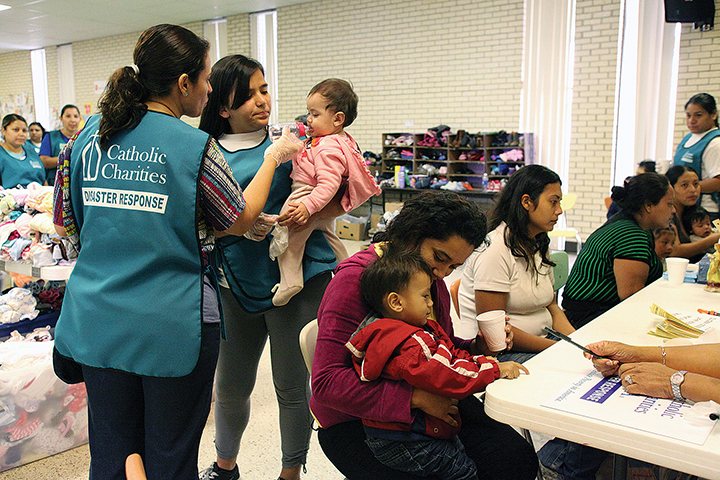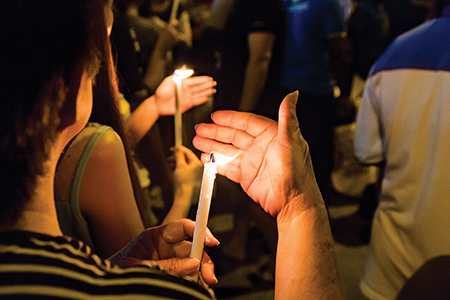
The relationship between volunteering and giving
The Generosity Gap, a recent report by Barna produced in partnership with Thrivent Financial shows that volunteering is considered one of the most generous acts possible. The report also examines the correlation between volunteering and other forms of generosity — in particular, financial giving.
Study participants were asked to select, from a list of possibilities, the three acts they consider to be most generous. After taking care of a sick person (No. 1), second on the list among all Christians is volunteering for an organization (52%).
While the study finds that Christians have a high opinion of volunteering as a form of generosity, they also, apparently, see it as interchangeable with financial offerings. Only one in five Christians disagrees that it would be acceptable to give of one’s time instead of one’s money to their church.
Pastors, however, don’t seem to regard these two activities in the same light. More than eight out of 10 disagree strongly (67%) or somewhat (18%) that “it is okay for a member who volunteers extensively not to give financially.”
Volunteering and financial giving
As Barna notes, the gap between pastors and parishioners on this point is interesting, given that volunteering appears to be a focus of sermons more often than financial giving. For instance, only 39% of pastors say they or other leaders speak from the pulpit about tithing or giving to the church at least once a month (17% once per month, 22% multiple times per month). Meanwhile, more than six in 10 say they or other leaders speak from the pulpit at least once a month on the topic of volunteering (35% once, 27% multiple times).
“If pastors’ own messages seem to prioritize acts of service over financial giving, it’s not too surprising that people in their pews highly value volunteer hours, even as an appropriate substitute for a monetary gift,” the authors state.
Regardless, as Barna points out, it’s a good idea for pastors to focus on both forms of generosity, as the data highlights a strong link between serving and financial giving. Findings show Christians who give most are also most likely to say they have volunteered within the past week or month.
“The pattern also holds true for those who consider generosity extremely important,” the authors add. “In other words, Christians prone to participate in one type of giving aren’t looking to get a pass on the other. Whether giving of money or of time, generous Christians are simply generous.”
Why Americans go (and don’t go) to religious services
New findings from Pew Research Center Religion & Public Life show many Americans cite practical or personal reasons, rather than lack of belief, for staying home from religious services.
 According to the new report, the percentage of U.S. adults who say they regularly attend religious services has been declining in recent years. Meanwhile, the share of Americans who attend only a few times a year, seldom or never has also been growing.
According to the new report, the percentage of U.S. adults who say they regularly attend religious services has been declining in recent years. Meanwhile, the share of Americans who attend only a few times a year, seldom or never has also been growing.
While the survey finds that the main reason people regularly go to church, synagogue, mosque or another house of worship is obvious — to feel closer to God — the things that keep people away from religious services are more complicated.
“Among those who attend no more than a few times a year, about three-in-10 say they do not go to religious services for a simple reason: They are not believers,” the authors state. “But a much larger share stay away … for other reasons.”
Many people, for instance, say they practice their faith in other ways. Others cite things they dislike about particular congregations or religious services (they haven’t found a church or house of worship they like, or they don’t like the sermons, for example). Still others name logistical reasons — being in poor health, short on time, etc. — as very important reasons for not regularly attending religious services.
By their own description, those who cite reasons other than a lack of belief for avoiding church are a fairly religious group. About seven-in-10 identify with a religion (including six-in-10 who are Christian), and most say religion is either “very” or “somewhat” important in their lives.
“To be sure, they are not as religious as Americans who report going regularly to religious services,” the authors report. “But by several standard measures, they are much more religious than those who say, ‘I am not a believer.’”
Demographically, more than half of those who do not attend church or another house of worship for reasons other than nonbelief are women. As the authors point out, these women “tend to be older, less highly educated, and less Democratic” compared with those who do not go because of a lack of faith.
Meanwhile, those who refrain from attending religious services because they are nonbelievers are more highly educated and largely male, young and Democratic.
In a follow-up question, regular worship attenders were asked to choose the most important reason they do attend religious services. Overall, six-in-10 say they go to religious services primarily to become closer to God.
“[A]nd no other reason comes close,” the authors state. “For example, just 8% say they go to religious services mainly to become a better person, and about one-in-20 say they attend religious services primarily to be part of a community of faith, to find comfort in troubling times, to provide their children with a moral foundation, or because they find the sermons valuable.”
Personal touch drives churchgoer giving
According to a recent report from LifeWay Research, more than half of Protestant churchgoers say a personal connection inspired them to give money to a charity for the first time.
Social media, such as Facebook, inspired only 4% of similar donations.
Three-quarters of churchgoers support at least one charity besides their church. Almost half do volunteer work. A similar number changed the charities they support.
“Churchgoers like to give — and to get involved,” says Scott McConnell, executive director of LifeWay Research.
“The question is, where will churchgoers give this year? The answer lies in having a personal connection,” McConnell said. “It turns out charity really does start close to home.”
 The nationally representative study asked adults who attend a Protestant church at least once a month to look at their charitable giving from 2016. Sixty percent of those churchgoers gave to the same number of charities in 2016 as they did the previous year. Fifteen percent gave to more charities. Eight percent gave to fewer, while 15% were not sure.
The nationally representative study asked adults who attend a Protestant church at least once a month to look at their charitable giving from 2016. Sixty percent of those churchgoers gave to the same number of charities in 2016 as they did the previous year. Fifteen percent gave to more charities. Eight percent gave to fewer, while 15% were not sure.
Among those who donated to charities, 49% made changes in which charities they supported in 2016. This included about a third (31%) who gave to a charity they’d never supported before.
“The reality is that funding for charities is anything but stable,” McConnell adds. “When a donor adds a charity, it can take away from ministries they have supported in the past.”
When asked what factor prompted them most to give, 21% say they knew someone who worked there. Nineteen percent had met someone from the charity, while 18% say friends of theirs supported the charity. Fifteen percent had been to a fundraiser, while 15% had received a letter from the charity. Eleven percent had volunteered for the charity.
Phone calls (5%), television ads (5%), social network sites such as Facebook (4%), online ads (3%) and email appeals (2%) were less influential.
Meanwhile, about half (48%) of churchgoers say they volunteer at a charity — including their church. Forty-four percent don’t volunteer. Eight percent aren’t sure.
Those who go to church at least once a week (51%) are more likely to say they volunteer than those who attend once or twice a month (30%). More than half of Methodist (63%), Lutheran (55%) and nondenominational churchgoers (53%) volunteer. Baptists (38%) are less likely.
“Donors come and go frequently,” McConnell says. “It helps to know why they give in the first place — typically a personal connection to the ministry or charity.”


